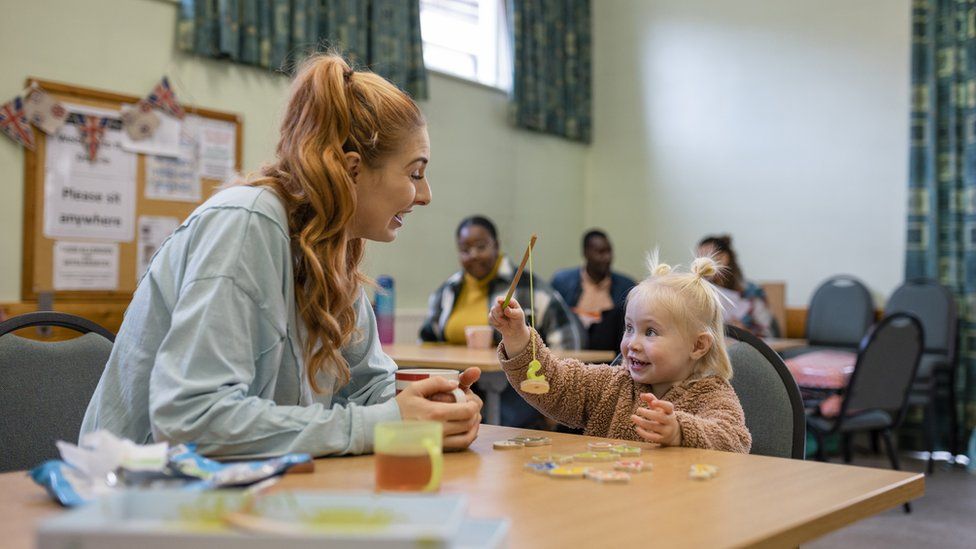
Children from low-income families who grew up near a Sure Start centre did better than their peers at GCSEs, says the Institute for Fiscal Studies (IFS).
Its research says those living near a centre performed up to three grades better than those further away.
Sure Start centres started in 1998 to give parents of toddlers extra support, especially in disadvantaged areas, but many have closed.
The Department for Education has been approached for comment.
The IFS study, funded by the Nuffield Foundation, used postcodes from when children were five years old to determine roughly how close the nearest centre was.
It then looked at the GCSE results of those children 11 years later and found “big improvements” in the performance of those living near a centre, especially those from low-income backgrounds.
The study found a child on free school meals who got DDD in their GCSE grades would be more likely to get three Cs – or three 3s would become three 4s under the current boundaries – if they lived close to a Sure Start centre in their early years.
Former prime minister Gordon Brown, the Labour chancellor who first announced the initiative in 1998, said the UK “desperately needs a new Sure Start”.
“These results tell us in detail what most parents already know,” he told the Guardian. “That if you provide a supportive environment to children in their early years and invest in their futures, the results will be life-transforming.”
Among all children in the study, those who lived near a Sure Start centre performed better at GCSEs than those who lived further away, but the trend was more pronounced among those eligible for free school meals, and those from minority ethnic backgrounds.
The effects were more pronounced at centres which started earlier in the programme, the IFS said, as they tended to have bigger budgets and better outreach to help bring in families who could benefit from using them.
The scheme improved early support for children with special educational needs, and reduced the need for expensive education, health and care plans in their teenage years, the IFS said.
Sure Start was introduced by Tony Blair’s Labour government in 1998 as “one-stop shops” providing parents of children under five with integrated support around health, education, childcare and employment, particularly in disadvantaged areas.
At its peak in 2010, the IFS says spending on the scheme topped out at £2.5bn in today’s prices, with more than 3,000 centres around the country.
An IFS report from 2019 found Sure Start reduced the number of children being admitted to hospital, but said funding for the scheme had been cut and 500 sites had closed.
Sarah Cattan, an IFS research fellow who co-authored the report, said government spending on early years had “significantly increased” since 2010, but had shifted away from integrated services and towards funding free childcare.
The government still provides support in the form of family hubs, provided by 75 councils in England, which are designed to improve health and education outcomes for young children and their families.
But Ms Cattan said the hubs currently receive a fraction of what was spent on Sure Start at its peak, so are “unlikely to go as far in realising the potential” of integrated early years services.
Niamh Sweeney, deputy general secretary of the National Education Union, said Sure Start had been “decimated, leaving families in desperate need of support”.
Neil Leitch, chief executive of the Early Years Alliance, said the IFS study showed that children’s centres provide “vital” opportunities to “support children’s long-term development and improve their life chances”.
He added: “While the government’s new programme of family hubs is undoubtedly welcome, with the current rollout limited to 75 local authorities, it’s very difficult to see how the plans will compensate for the sheer scale of children’s centre closures that have taken place over recent years.”
